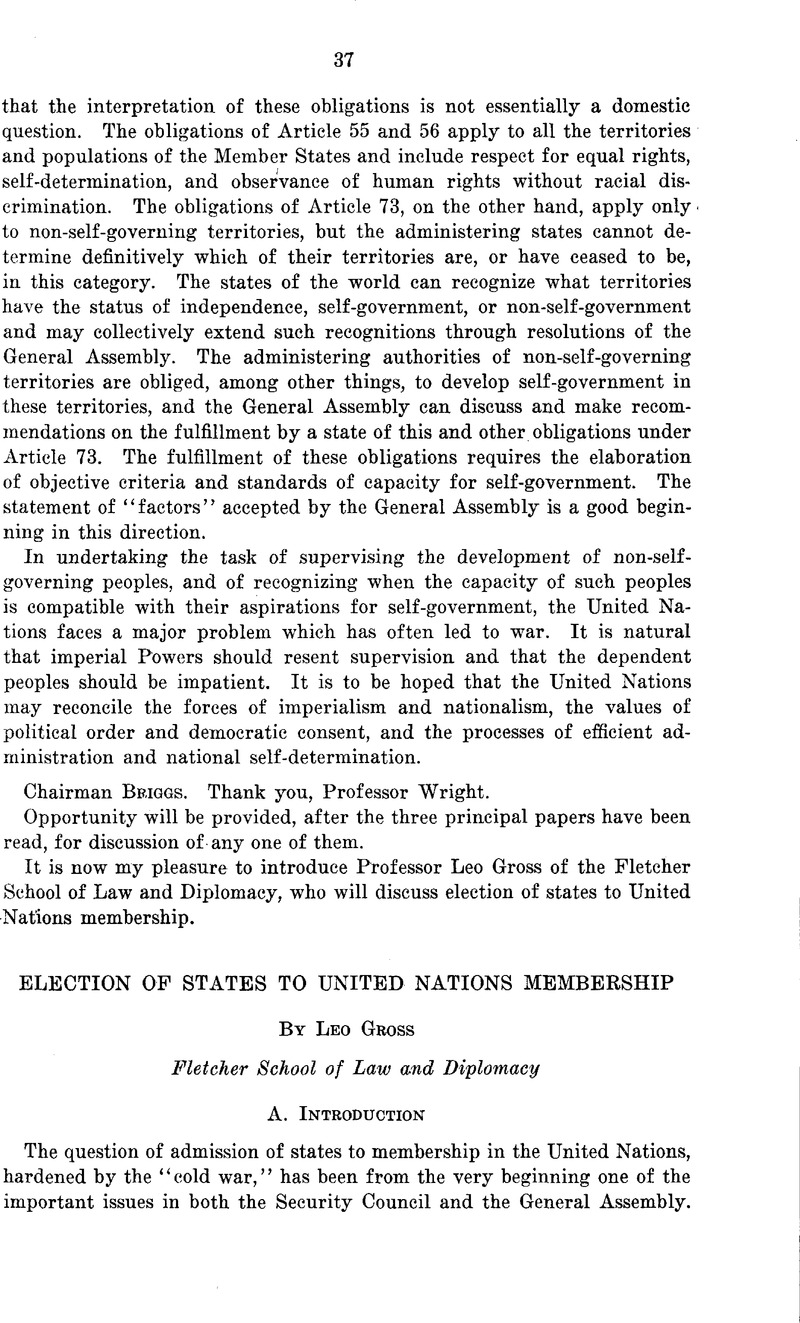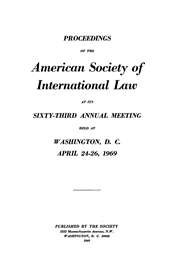Article contents
Election of States to United Nations Membership
Published online by Cambridge University Press: 27 February 2017
Abstract

- Type
- Second Session
- Information
- Copyright
- Copyright © American Society of International Law 1954
References
1 Memorandum on the Historical Background of the Question of the Admission of New Members (hereinafter referred to as Memorandum), U.N. Doc. A/AC.64/L.1, p. 110.
2 Ibid., p. 109.
3 Report of the Special Committee on Admission of New Members (hereinafter re ferred to as Report), U.N. Doc. A/2400, p. 17.
4 Resolution 718 (VIII) adopted Oct. 23, 1953. General Assembly, 8th Sess., Official Records, Supp. No. 17 (A/2630), p. 5.
5 United Nations Bulletin, Vol. XVI, Jan. 15, 1954, p. 64.
6 Memorandum, p. 11. Italies supplied.
7 Ibid., p. 13.
8 Ibid., p. 15.
9 Ibid., p. 17. The Report of Committee II/1, Doc. 1092 (UNCIO VIII, p. 495), which included this statement, was adopted by Commission II, Docs. 1151, 1180 (UNCIO VIII, pp. 193, 265), and by the Plenary Conference on June 25, 1945, at its ninth meeting, UNCIO Doc. 1210, Vol. I, p. 623.
10 In chronological order : Afghanistan, Iceland, Sweden, Thailand, Pakistan, Yemen, Burma, Israel, Indonesia. Memorandum, Annex I.
11 Ibid.
12 Jordan, Ireland, Portugal, Italy, Austria, Finland, Ceylon, Republic of Korea, Nepal, Viet-Nam, Libya, Japan, Cambodia, Laos.
13 Japan, Viet-Nam, Cambodia, Laos, Libya, Jordan, by General Assembly Resolution 620 (VII) B-G adopted on Dec. 21, 1952. Ibid., pp. 111-113.
14 Albania, Mongolian People’s Republic, Hungary, Rumania, Bulgaria, Democratic People’s Republic of Korea, Democratic Republic of Viet-Nam. As of April, 1953, the application of the Democratic People’s Republic of Korea had not been voted upon by the Security Council. Ibid., Annex I.
15 General Assembly Resolution 113 (II)B, adopted Nov. 17, 1947. Ibid., p. 40.
16 I.C.J. Reports, 1948, p. 57, at p. 62.
17 ibid., at p. 63.
18 “The Twenty-Seventh Year of the World Courts” American Journal of International Law, Vol. 43 (1949), p. 8.
19 I.C.J. Reports, 1948, at pp. 90, 91.
20 Ibid., at p. 92.
21 Ibid., p. 93.
22 Memorandum, p. 11.
23 Report, p. 16.
24 Resolution 506 (VI) A. General Assembly, 6th Sess., Official Records, Supp. No. 20 (A/2119), p. 4.
25 Ibid. Italics supplied.
26 Art. 1, par. 2, of the Covenant.
26a Art. 43.
27 Gross, Ernest A., “Revising the Charter,” Foreign Affairs, January, 1954, pp. 203–216, at p. 211CrossRefGoogle Scholar.
28 Fitzmaurice, G. G., “The Law and Procedure of the International Court of Justice : International Organizations and Tribunals,” 29 British Year Book of International Law (1952) 1-62, at 23Google Scholar.
29 I.C.J. Reports, 1948, p. 57, at p. 71.
30 Ibid. Judge Azevedo expressed a similar view. He too concurred with the majority and argued that an applicant which satisfies all the required qualifications has a right to have his application accepted. He concluded, nevertheless, by saying his answer “will not hinder the political activity of the organs that are responsible for the maintenance of peace; for elements of expediency, manifest or hidden, can always be considered when reasonable use is made of the wide possibilities opened by Article 4 of the Charter. Respect for law must never constitute a reason for disturbing international harmony, nor cause an upheaval in the life of any society.” Ibid., p. 81.
31 Memorandum, p. 53.
32 Fitzmaurice, loc. cit., pp. 54, 55: “. . . advisory opinions are authoritative in the sense that their legal correctness cannot be officially or formally questioned by the organ to which they are rendered, acting in its corporate capacity. . . . Since . . . advisory opinions are sought by and rendered to the international organs entitled to request them, it can be argued that no individual state is obliged to regard them as having even an authoritative character legally. Nevertheless . . . whatever be their formal authority, their persuasive character and substantive authority must be great.”
33 Hambro, Edvard, “The Authority of the Advisory Opinions of the International Court of Justice,” 3 International and Comparative Law Quarterly (January, 1954) 2–22, at 21CrossRefGoogle Scholar.
34 Ibid., p. 3. “Whatever the vote in the Security Council, whether with or without the veto, when a recommendation was not approved, whatever the reason might be, that decision signified only that the Council did not wish to recommend the candidate. Thereafter, that decision must be transmitted to the General Assembly for final decision by the latter.” General Assembly, 3rd Sees., Pt. I, Official Records, Ad Hoc Political Committee, p. 121.
35 Memorandum, p. 76. Resolution 296 (IV)J, adopted Nov. 22, 1949.
36 I.C.J. Reports, 1950, p. 4, at p. 9.
37 Ibid., at pp. 9 and 10.
38 Report, pp. 5-6.
39 Ibid., p. 5.
40 Ibid., pp. 8, 10-12.
41 Ibid., p. 8. See also Fitzmaurice, loc. cit., p. 33, who after considering the different senses in which the term “decision” or “recommendation” is used in the Charter, concludes: “But on the actual language of paragraph 2 of Article 4 as interpreted by the Court, the position is that the Security Council either recommends admission or it fails to recommend admission. In the latter event, it is not the case that there is a recommendation not to admit. There is simply no recommendation at all. Since the Assembly can only admit an applicant for membership ‘upon the recommendation of the Security Council’, it follows that it cannot admit in such a case; it can discuss or disapprove, but it has no power to admit, because the essential basis is lacking. This was the real essence of the Court’s finding.”
42 Report, p. 9.
43 General Assembly, 3rd Sess., Pt. I, Official Records, Aă Hoc Political Committee, pp. 60, 62.
44 Report, p. 4.
45 Ibid.
46 Ibid., p. 4 (Peru), p. 5 (El Salvador), p. 5 (Argentina), p. 7 (Cuba).
47 U.N. Doc. A/AC.61/30. Also reproduced in Doc. A/AC.64/L.4, pp. 2-3.
48 U.N. Doc. A/AC.61/L.31; reproduced in Doc. A/AC.64/L.4. Italics supplied.
49 See, for instance, the arguments of Egypt, the United States and United Kingdom, Report, pp. 8-9.
50 Ibid., p. 9.
51 General Assembly Resolution 296 (IV) K, adopted Nov. 22, 1949. Memorandum, p. 76.
52 Report, p. 9.
53 Ibid.
54 Ibid., p. 10.
55 Ibid., p. 4.
56 U.N. Doc. A/AC.61/30, also reproduced in Doc. A/AC.64/L.4, p. 3.
57 Report, p. 7.
58 Ibid., p. 9. See also the argument of the Netherlands representative to the same effect, ibid., p. 12.
59 Wright, Quincy, “Some Thoughts about Recognition,” American Journal of International Law, Vol. 44 (1950), p. 552 CrossRefGoogle Scholar. See also Humber, P. O., “Admission to the UN,” 24 British Year Book of International Law (1947) 101 Google Scholar-102; Briggs, Herbert W., “Community Interest in the Emergence of New States: The Problem of Recognition.” Proceedings, American Society of International Law, 1950, p. 179 Google Scholar.
60 U.N. Doc. A/AC.64/L.3, also reproduced in Report, pp. 17-19. Italics supplied.
61 See Gross, Leo, “The Double Veto and the Tour-Power Statement on Voting in the Security Council,” 67 Harvard Law Review (1953) 259 CrossRefGoogle Scholar, 262, 275, 276. See also Rudzinski, Alexander W., “The So-Called Double Veto,” American Journal of International Law, Vol. 45 (1951), pp. 454 CrossRefGoogle Scholar, 456, 459, 461.
62 Report, p. 9.
63 Ibid., p. 10.
64 U.N. Doc. A/AC.61/30, also reproduced in Doc. A/AC.64/L.4, p. 3.
65 Report, p. 9.
66 Ibid.
67 Ibid., p. 12.
68 Report, p. 20.
69 Jenks, C. Wilfred, “The Impact of International Organisations on Public and Private International Law,” Grotius Society Transactions for the Year 1951, Vol. 37 (1952), p. 59 Google Scholar.
70 Report, p. 20.
71 General Assembly Resolution 34 (I), Resolutions adopted by the General Assembly during the First Part of its First Session from 10 January to 14 February, 1946, U.N. Doe. A/64/Add.l, p. 61.
72 Memorandum, p. 20; and Security Council, Official Records, First Year, 2nd Ser., No. 4, pp. 41-43.
73 Memorandum, ibid.; Security Council, Official Records, loc. cit., pp. 43-52.
74 Memorandum, pp. 20-21; Security Council, Official Records, loc. cit., pp. 47-50.
75 Memorandum, p. 21; Security Council, Official Records, loc. cit., p. 53, and No. 5, pp. 114-124.
76 Memorandum, p. 29.
77 Ibid., pp. 29-30.
78 Ibid., p. 33.
79 Ibid., pp. 33-34.
80 Ibid., p. 89.
81 Ibid., pp. 109-110.
82 Report, pp. 13, 20. The quotation is from Mr. Dulles’ book, War and Peace (1950), p. 190.
83 Report, p. 13. See Philippine statement, ibid., p. 14.
84 Ibid., pp. 14-16.
85 Ibid., p. 15.
86 Ibid., pp. 13-14.
87 Ibid., p. 15.
88 Ibid., p. 16.
89 Report, p. 15.
90 See Ernest A. Gross, loc. cit., p. 210.
91 Special Study Mission to Southeast Asia and the Pacific. Report by Hon. Walter H. Judd, Chairman, submitted to the Committee on Foreign Affairs, 83rd Cong., 2nd Sees., Committee Report, pp. 100-101.
92 The New York Times, March 19, 1954, p. 3, and March 21, 1954, Sec. 4, p. 2. Also London Times, March 19, 1954, p. 3.
93 “United Nations Charter Review.” Statement by Secretary Dulles made before the Charter Review Sub-Committee of the Senate Foreign Relations Committee on Jan. 18, 1954. Dept. of State Bulletin, Vol. XXX, No. 762 (Feb. 1, 1954), p. 171.
- 1
- Cited by




